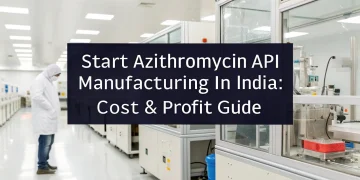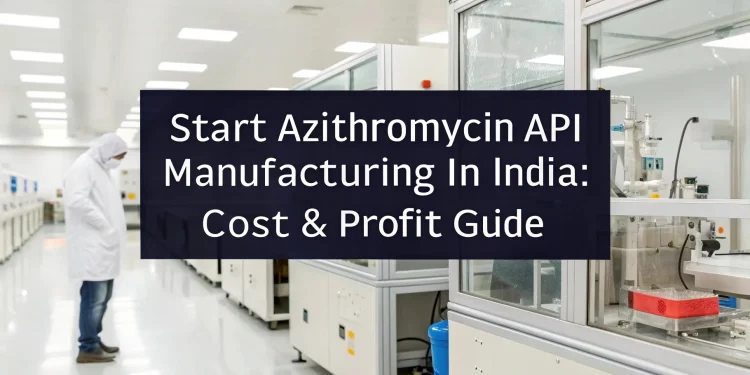Azithromycin remains unmatched as a globally recognized macrolide antibiotic within the context of the constantly changing and growing pharmaceutical industry. The need for Azithromycin API increased tremendously during the COVID-19 pandemic when it served as an auxiliary antibiotic, just as it did for treating respiratory infections, typhoid, and even sexually transmitted diseases. Owing to its historic strengths in bulk drug production, the Indian pharmaceutical manufacturing industry is well placed to leverage that opportunity.
Current international regulatory frameworks, along with production-linked incentives for domestic API (Active Pharmaceutical Ingredient) manufacturing, make this an extremely favorable window for entrepreneurs and businesses for large-scale Azithromycin manufacturing.
In India, this initiative would also be viable with regards to operational economies, capital investment, production volume and scalability, export possibilities, and industrial consultancy from NPCS, who are offering project-based assistance to new players in the segment. The goal of this article is to analyze the cost-benefit structure of setting up an Azithromycin API production facility in India.
Increasing Global and Domestic Need for Azithromycin API
Besides the Azithromycin commodity which is very much used domestically as an antibiotic, it is also traded globally. It is included in the WHO Model List of Essential Medicines and is used in treatment in more than hundred countries due to its antimicrobial activity. It is remarkably useful in treating acute infections due to its long retention in body tissues, and high patient adherence as well as ease of use.
Due to the fact that it is available as a single dose, this medication is known to have high compliance. Often times, it is also used as the primary drug when there is resistance formed to older antibiotics such as amoxicillin or penicillin. Due to all these noted factors, Azithromycin is widely used in all countries whether developed or in the stage of development.
With India, there is a competitive advantage because it has cheap manufacturing as well as a skilled chemical work force; therefore it is an exporter of Azithromycin API to Latin America, South East Asia, Africa and parts of Europe.
Over these five years, India is expected to take on more of the global market as there are lower costs to produce, increasing capacity to produce and more approved plants by USFDA and WHO-GMP. Because of this, the India Azithromycin market is estimated to have a steady CAGR increase from 6 to 8 percent. The growing need for Azithromycin assures long-term value for new manufacturing facilities.
Infrastructure and Capital Investments Pertaining to Manufacturing
Construction of an Azithromycin API Unit entails substantial capital expenditures, with emphasis on infrastructural facilities, equipment, and attaining environmental permissions. Such a plant would have an annual production capacity of 100 tonnes and would require an industrial land of around 1 to 1.5 acres, optimally situated within a pharmaceutical SEZ or a state designated bulk drug park. The land cost coupled with civil construction of the factory buildings, administrative block, and utility areas usually amounts to anywhere between ₹2.5 to ₹5 crores.
Process equipment forms the tech backbone of the manufacturing infrastructure. Irreversible processing requires both a solid-liquid separation section and a crystallization section which comprises centrifuges and filter dryers to isolate the product, then chillers and crystallizers to form the resulting product. The final drying of the product occurs in either vacuum tray or spray dryers.
Also, process control automation, evaporators, recovery systems, and zero liquid discharge treatment systems for the effluents are critical for solvent recovery. All of these have to be integrated to meet Good Manufacturing Practices (GMP) and norms pertaining to the discharge of wastes into the environment. The estimate for plant and machinery purchase in this case amounts to roughly ₹10 to ₹15 crores, which in this example represents the bulk of the fixed capital expenditure.
In addition to the equipment required, cleanroom steam boilers, HVAC systems, backup power supplies, compressed air supplies, analytical labs, and other steam infrastructure are also essential. These installations further increase the capital expenditure by approximately ₹3 to ₹4 crores. Moreover, project engineering, technical consultation, licenses, and pre-operational work may cumulatively cost around ₹2 crores.
Overall, the estimated fixed capital of setting up a medium-sized Azithromycin API unit in India ranges from ₹17 to ₹26 crores.
Related: Start a Biotechnology API Business in India
Change in Provinding Materials and Costs of Operation
The synthetic production of Azithromycin usually begins with erythromycin base or its more advanced precursors, such as 9-deoxo-9a-aza-9a-homoerythromycin. This includes various chemical reactions, notably acylation coupled with methylation, tosylation, and deprotection steps. Consequently, nearly half of the total operating cost of the unit is incurred on raw materials.
Starting materials consist of Erythromycin or semi-synthetic precursors of macrolides alongside ergents like tosyl chloride, acetic anhydride, methyl iodide, and sodium hydroxide or potassium carbonate.
Methanol, acetone, dichloromethane, and isopropanol are classified as solvents and are used in large quantities. These solvents must go through recovery systems, which increases profitability, constantly. Based on the source and volume of purchase, the current market price for raw materials is averaged between ₹4,000–₹6,000 per kilogram of finished API.
In addition, labor costs have become an important part of business spending. An API unit employs skilled chemists, production supervisors, QA and QC specialists, machine operators, utility personnel, and assisting staff. For a unit of one hundred tons per annum, the monthly payroll exceeds ₹10–₹12 lakhs. With this comes other recurring expenses such as utility services: electricity, water, steam generation, etc. These, along with fuel for the boilers, sum to a total of ₹5–₹8 lakhs monthly.
Expenditures of breakdown repairs along with instrument calibrations add to annual spending. Continuously provided quality control activities face yearly prices of ₹10–₹12 lakhs for reagents, chromatographic materials, and standards. Increased spending of ₹100–₹200 per kg shifts the total from ₹10–₹12 lakhs for labeling systems, HDPE drums, and liners.
The estimated annual operating cost of a 100 TPA Azithromycin production facility is around ₹50 to ₹55 crores, based on the previously stated figures.
Working Capital And Cash Flow
To sustain seamless operations, a business needs to maintain an inventory of raw materials, wages, and operational cash amounting to two months—this requires a minimum infusion of ₹3 to ₹4 crores in working capital. Short-term bank and NBFC loans are useful for cash flow management, while long-term loans with grace periods are better suited for project financing.
Debt servicing remains a cost that is tied to the business’s credit profile and loan agreement. As with most financing, this will generally fall within the 10%-12% zone per annum. Fixed assets also incur depreciation which is usually computed at a fixed rate per annum or using straight-line methods. Such depreciation is a non-cash expense which reduces tax liability, thus effectively increasing taxable profit.
Revenue Streams and Profitability Outlook
A 100 TPA Azithromycin plant running at full capacity yields an annual production of 100,000 kilograms of API. Currently, the domestic market sells pharmaceutical-grade Azithromycin for ₹7,500 to ₹8,500 per kg. API is even more valuable for export, often priced from ₹8,500 to ₹10,000 per kg, depending on quality certifications and the market of destination. With an average selling price of ₹8,500 per kg, total annual revenue reaches ₹85 crores.
With an annual operating cost of approximately ₹55 crores, EBITDA sits between ₹25 to ₹30 crores leading to a strong profitability index of 30–35%. Net income settles to ₹15 to ₹18 crores after depreciation, interest payments, and tax obligations are settled. This creates an ROI of 25–30% each year.
Most importantly, the breakeven point for capital investment can be achieved in 2.5 to 3.5 years depending on sales performance and market conditions. Such financial resilience makes manufacturing Azithromycin APIs a compelling investment opportunity for new pharmaceutical market entrants, venture capitalists, and startups.
Related: Azithromycin, Cefixime, Telmisartan, Diclofenac Sodium, Acecloflenac Manufacturing. Production of Active Pharma Ingredients (API).
Importance of NIIR Project Consultancy Services in Execution of the Project
In the API sector, if an entrepreneur or a small and medium enterprise (SME) requires help in estimating feasibility, choosing equipment, regulatory compliance, or market positioning, a consultancy can address nearly all of these concerns. NPCS has carved a niche for itself in India for providing detailed techno-economic feasibility reports (DPRs) which also include market survey reports and business planning documents, hence it is preferred for Azithromycin API manufacturing.
While NPCS assists in the revenue projection and other pivotal subtotals, complex computations like DSCR, IRR, and even breakeven analysis are provided alongside. For Grant of Preliminary Approval SOPs, NPCS USFDA and Pollution Control Board APS provided infrastructural compliance along with risk management compliance and complex financial forecasting that integrated breach analyses as well as primary infrastructural expenditure costs forecasting for burdened finances mitigated with infrastructural costs.
With the analytics NPCS offers, new clients along with the established ones who undertake projects that guarantee high ROI are bound to succeed owing to NPCS’s profound understanding of the market and production of bulk drugs. NPCS also provides reports aimed at specific targets that aid in overcoming budgetary limits and geospatial advantages, thus making the reports applicable to all forms of expansions.
Conclusions: Considerations for Strategically Gaining Value from Azithromycin API
Recently, a great deal of attention is focused on Azithromycin APIs as industry sector due to global initiatives spearheaded to incentivize local production of pharmaceuticals and build strong supply chains. The existing and emerging Indian engineering and manufacturing market capabilities, coupled with innovative cost-effective frameworks, positions India to take advantage of the gap in the world market for establishing an Azithromycin API unit.
It goes without saying this is not just an economic opportunity but one that promises sustainable growth in Califorida health policy, affordably framing it within both domestic and international landscapes.
In the realm of Indian chemicals and pharmaceuticals, Azithromycin’s API production stands out as one of the most enticing prospects given the sufficient size of the market, potential for positive exports, and increasing government support for policies encouraging API manufacturing.
The first movers are the ones who boldly take the risk of early investment in unexplored territory supported by business strategies from thorough feasibility assessments such as those provided by Niir Project Consultancy Services. This fast-paced marketplace will reward those willing to decisively act for the many years.


















